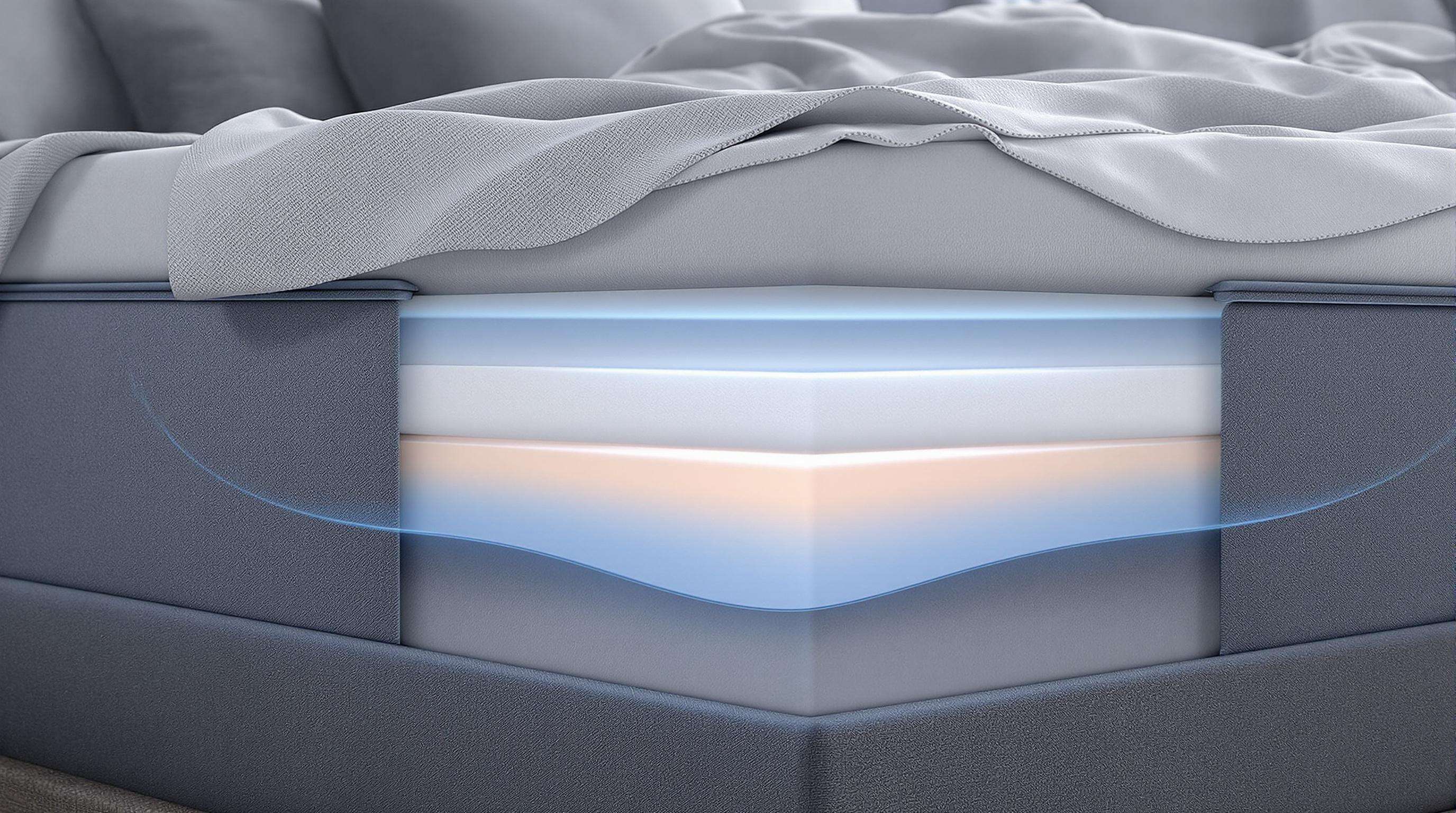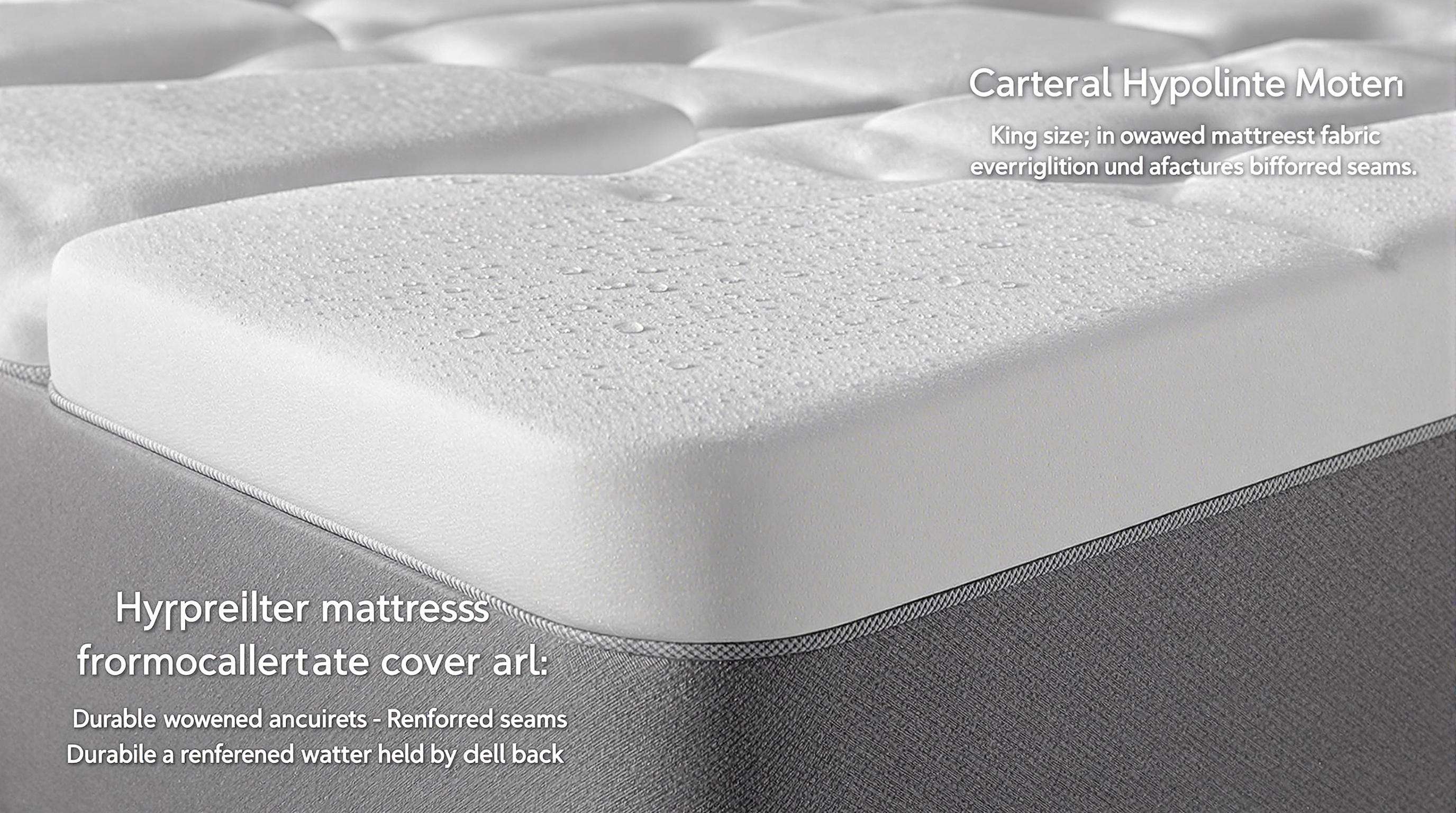The materials we choose really affect how well we sleep and how long our mattresses last. Polyester is great because it doesn't cost much and lasts forever, but if someone gets hot during the night, cotton might be a better bet since it lets air circulate so much better. Wool has this amazing ability to regulate temperature naturally, and according to some research from Sleep Science in 2023, wool keeps people comfortable about 30% longer than synthetic stuff does. There are also newer materials on the market now, like Tencel which comes from plants and can pull away moisture twice as fast as regular fabrics. And let's not forget about cashmere either, which feels absolutely incredible against the skin. Most stores carry these different materials in their selection for king size mattress covers too.
People who care about the environment are starting to look for things like GOTS certified organic cotton and wool that's free from chemicals since these materials break down naturally and can be replenished over time. Take bamboo rayon for example it grows back pretty fast, usually reaching full growth within just 3 to 5 years. Studies from the Textile Sustainability Journal show this material cuts down on environmental impact by around two thirds when compared with regular fabrics. What makes these eco friendly options so great is that they still provide good comfort for those big king size mattress covers without adding much waste to landfills. Some folks even find them softer than traditional materials despite being better for planet earth.
Cotton barriers that are tightly woven stop around 97% of dust mites from getting through, as shown by tests from the Allergy Research Foundation. Tencel fibers engineered at the molecular level actually stop bacteria from growing naturally, no chemicals needed for this effect. The lanolin found in Merino wool gives it antimicrobial qualities too. Fabrics that carry the OEKO-TEX certification contain absolutely no toxic substances left behind after production. This matters a lot for people with asthma who report their symptoms get better by about 42% when they switch to hypoallergenic bedding materials, according to research published by Respiratory Health Alliance in 2023.

Mattress covers that let air flow through them help stop heat from building up, which is really important if someone wants to sleep all night without waking up sweaty. Natural fabrics such as organic cotton and linen have looser weave patterns compared to man made stuff, allowing about 30 percent better airflow generally speaking. The way these materials breathe lets excess body warmth escape during the night, so they work great for people who tend to get warm while sleeping. Many folks find themselves tossing and turning when their bedding traps heat, so switching to breathable options can make a real difference in comfort levels throughout the night.
New fabric technologies are making big strides when it comes to staying cool without sacrificing strength. These special phase change materials work pretty cleverly actually they soak up extra warmth when someone is sleeping then let it go again once the room gets cooler, which helps maintain that comfortable feel all night long. Some recent research from textile engineers back in 2024 showed something interesting too their tests indicated that bedsheets infused with PCMs cut down on those uncomfortable hot flashes during the night by around 22%. For people who tend to sweat at night, there are also breathable options available. Tencel lyocell fabrics pull moisture away from the skin effectively, keeping things drier. And let's not forget about organic cotton either its naturally hypoallergenic properties help fight off bacteria buildup over time.
Cutting-edge solutions address extreme temperature fluctuations:
For king-size mattress covers, prioritize materials with stretchable edges and adaptive technologies to ensure full-surface temperature regulation without sacrificing fit.

Water resistant barriers stop spills and dampness from soaking into mattresses too deeply, which helps keep them looking good and functioning properly for longer periods. Many products now come with antimicrobial treatments like silver ions that fight off bacteria, mold, and mildew buildup when regular cleaning isn't possible. The difference between water resistant and fully waterproof materials matters too water resistant options let some moisture escape through vapor while still blocking liquid penetration, making them practical for everyday use without trapping odors inside. Most quality mattress protectors made from durable polyester mixtures will last anywhere from three to five years if cleaned according to manufacturer instructions and not exposed to excessive wear or tear.
Good mattress covers act as barriers against spills, dust mites, pet hair, and pollen getting into the bedding. The fabric needs to be tightly woven so bed bugs can't get through those tiny pores smaller than 10 microns. Zipper seals that are specially designed for allergens help keep everything sealed at the seams too. People with asthma or young kids will find these hypoallergenic features particularly helpful. This matters even more for bigger beds like king sizes since there's just more surface area to protect. Plus, most of these covers can be washed regularly without losing their protective qualities, which means better long term hygiene for everyone sleeping on them.
Getting the right fit is really important because it stops things from moving around and keeps the mattress protected. Most people don't realize this but about 8 out of 10 covers that don't fit well let allergens get through after just six months according to Sleep Health Foundation research from last year. Before picking out any cover, take some time to actually measure all three dimensions of the mattress - height, width and depth matter a lot. King size mattresses are typically 76 by 80 inches, so check first if the cover has those split corner designs or needs special measurements when used with adjustable bed frames. When shopping for pillow top or hybrid mattresses specifically, look at the labels carefully. Deep pocket covers with pockets over 18 inches tend to work best with these types since they sit deeper on the mattress surface.
The elastic skirts on these mattress covers come with those 360 degree stretch straps that really hold everything in place. They create just enough tension along all sides so nothing slides around when someone moves during the night. Higher end options actually have those little silicone grip dots sewn right into the fitted sheet areas plus stronger corner attachments that keep things secure. People who get hot at night will appreciate the zippers with those special draft flap seals. These stop air from escaping but still let cool breezes circulate around whatever cooling technology might be built in. And for folks worried about spills, the waterproof variants use welded seams instead of regular stitching. This means no water can sneak through tiny thread holes if there happens to be an accident during the night.
Mattress covers that come off easily make keeping beds clean so much simpler. Just zip them off or pull them apart with Velcro and they're ready for the wash. This really matters when dealing with big bed sizes like king mattresses which can be a real pain to handle otherwise. Regular cleaning helps get rid of allergens consistently, which is great for people with sensitivities. Studies show washing these covers once a week cuts down on dust mites by about 95%. That means less stuff building up over time and no need to spend money on expensive professional cleaning services. The fast release system makes it easy for anyone taking care of someone else's bed or their own to keep things fresh and clean within just a few minutes.
How to clean these covers depends on what they're made from. Machine washable ones make life easier for tougher stuff like polyester blends, especially when run through cold water cycles that help keep them stretchy and maintain those waterproof features. On the flip side, materials with more delicate structures such as cashmere or those fancy phase change fabrics usually need spot cleaning instead. This helps maintain their ability to regulate temperature and keep out moisture. According to industry stats, covers that can go in the washing machine last about 40 percent longer than ones needing spot cleaning. Still worth checking what the manufacturer says though. Following their recommendations prevents damage to fibers and keeps those protective layers intact over time.
Organic and eco-friendly mattress covers are beneficial because they break down naturally, are replenishable, and reduce environmental impact. They also maintain comfort and are often softer than traditional materials.
Hypoallergenic mattress covers help sensitive sleepers by preventing dust mites and bacteria growth, improving symptoms for people with asthma, and containing no toxic substances.
Technologies such as phase change materials, GlacioTex, Celliant, and 37.5 Technology help regulate temperature by managing heat and improving airflow.
To ensure a proper fit, measure the mattress’s dimensions, check compatibility with adjustable bed frames, and consider deep pocket designs for pillow top or hybrid mattresses.
 Hot News
Hot News2025-09-04
2025-09-02
2025-09-01
2025-07-08
2025-06-10
2025-12-25